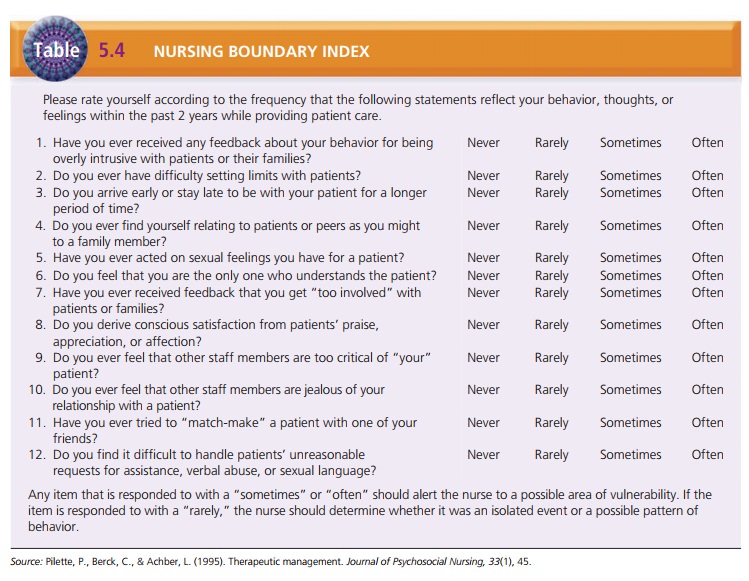Chapter: Psychiatric Mental Health Nursing : Therapeutic Relationships
Avoiding Behaviors That Diminish the Therapeutic Relationship
AVOIDING BEHAVIORS THAT DIMINISH
THE THERAPEUTIC RELATIONSHIP
The nurse has power over the client by virtue of his or her
professional role. That power can be abused if excessive familiarity or an
intimate relationship occurs or if confi-dentiality is breached.
Inappropriate Boundaries
All staff members, both new and veteran, are at risk for allowing a
therapeutic relationship to expand into an inap-propriate relationship.
Self-awareness is extremely important: The nurse who is in touch with his or
her feelings and aware of his or her influence over others can help maintain
the boundaries of the professional relationship. The nurse must maintain
professional boundaries to ensure the best thera-peutic outcomes. It is the
nurse’s responsibility to define the boundaries of the relationship clearly in
the orientation phase and to ensure those boundaries are maintained throughout
the relationship. The nurse must act warmly and empatheti-cally but must not
try to be friends with the client. Social interactions that continue beyond the
first few minutes of a meeting contribute to the conversation staying on the
sur-face. This lack of focus on the problems that have been agreed on for
discussion erodes the professional relationship.
If a client is attracted to a nurse or vice versa, it is up to the
nurse to maintain professional boundaries. Accepting gifts or giving a client
one’s home address or phone num-ber would be considered a breach of ethical
conduct. Nurses must continually assess themselves and ensure they keep their feelings
in check and focus on the clients’ interests and needs. Nurses can assess their
behavior by using the Nursing Boundary Index in Table 5.4.

Feelings of Sympathy and Encouraging Client Dependency
![]()
![]()
The nurse must not let feelings of empathy turn into sympa-thy for
the client. Unlike the therapeutic use of empathy, the nurse who feels sorry
for the client often tries to compensate by trying to please him or her. When
the nurse’s behavior is rooted in sympathy, the client finds it easier to
manipulate the nurse’s feelings. This discourages the client from explor-ing
his or her problems, thoughts, and feelings; discourages client growth; and
often leads to client dependency.
The client may make increased requests of the nurse for help and
assistance or may regress and act as if he or she cannot carry out tasks
previously done. These can be sig-nals that the nurse has been “overdoing” for
the client and may be contributing to the client’s dependency. Clients often
test the nurse to see how much the nurse is willing to do. If the client
cooperates only when the nurse is in attendance and does not carry out
agreed-on behavior in the nurse’s absence, the client has become too dependent.
In any of these instances, the nurse needs to reassess his or her professional
behavior and refocus on the client’s needs and therapeutic goals.
![]()
![]()
Nonacceptance and Avoidance
The nurse–client relationship can be jeopardized if the nurse finds
the client’s behavior unacceptable or distaste-ful and allows those feelings to
show by avoiding the cli-ent or making verbal responses or facial expressions
of annoyance or turning away from the client. The nurse should be aware of the
client’s behavior and background before beginning the relationship; if the
nurse believes there may be conflict, he or she must explore this possi-bility
with a colleague. If the nurse is aware of a prejudice that would place the
client in an unfavorable light, he or she must explore this issue as well.
Sometimes by talking about and confronting these feelings, the nurse can accept
the client and not let a prejudice hinder the relationship. If the nurse cannot
resolve such negative feelings, how-ever, he or she should consider requesting
another assign-ment. It is the nurse’s responsibility to treat each client with
acceptance and positive regard, regardless of the cli-ent’s history. Part of
the nurse’s responsibility is to con-tinue to become more self-aware and to
confront and resolve any prejudices that threaten to hinder the nurse– client
relationship.
Related Topics